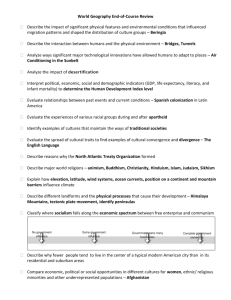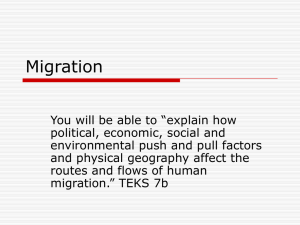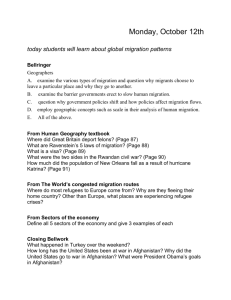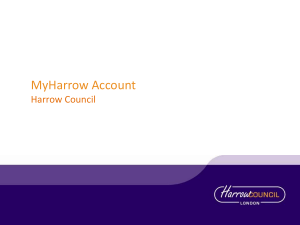Complexities and Challenges in Afghan Migration
advertisement
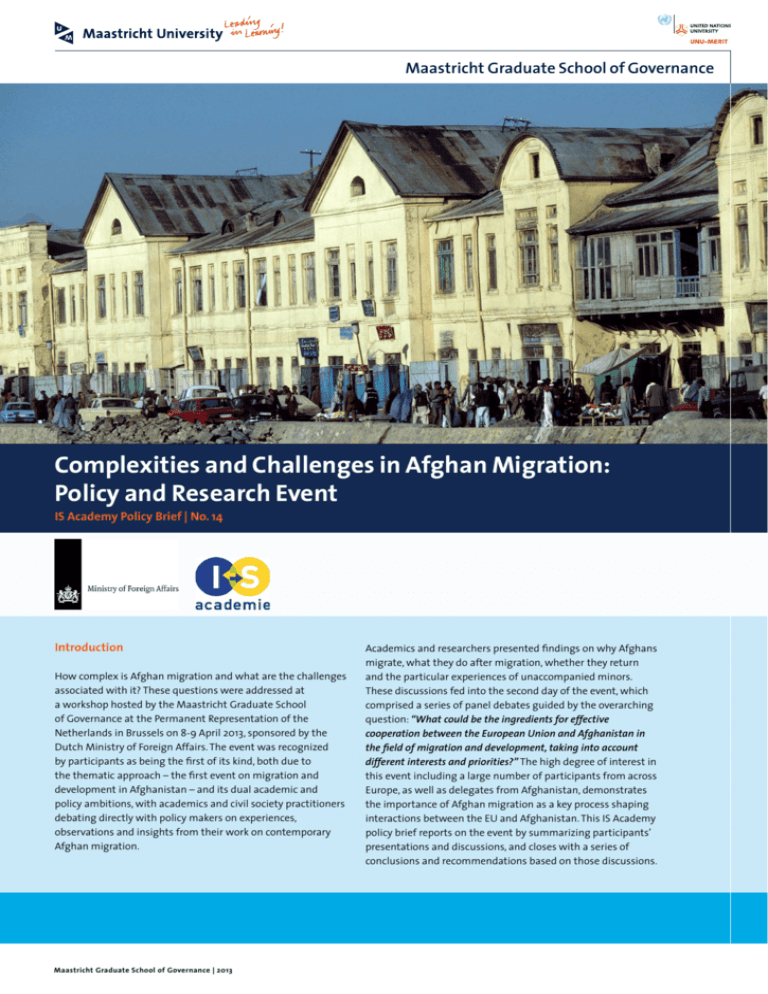
Maastricht Graduate School of Governance Complexities and Challenges in Afghan Migration: Policy and Research Event IS Academy Policy Brief | No. 14 Introduction How complex is Afghan migration and what are the challenges associated with it? These questions were addressed at a workshop hosted by the Maastricht Graduate School of Governance at the Permanent Representation of the Netherlands in Brussels on 8-9 April 2013, sponsored by the Dutch Ministry of Foreign Affairs. The event was recognized by participants as being the first of its kind, both due to the thematic approach – the first event on migration and development in Afghanistan – and its dual academic and policy ambitions, with academics and civil society practitioners debating directly with policy makers on experiences, observations and insights from their work on contemporary Afghan migration. Maastricht Graduate School of Governance | 2013 Academics and researchers presented findings on why Afghans migrate, what they do after migration, whether they return and the particular experiences of unaccompanied minors. These discussions fed into the second day of the event, which comprised a series of panel debates guided by the overarching question: “What could be the ingredients for effective cooperation between the European Union and Afghanistan in the field of migration and development, taking into account different interests and priorities?” The high degree of interest in this event including a large number of participants from across Europe, as well as delegates from Afghanistan, demonstrates the importance of Afghan migration as a key process shaping interactions between the EU and Afghanistan. This IS Academy policy brief reports on the event by summarizing participants’ presentations and discussions, and closes with a series of conclusions and recommendations based on those discussions. Maastricht Graduate School of Governance Background It is well understood that migration is a key coping strategy for Afghans – of whom 76 per cent have had some experience of displacement in their lifetime 1. Afghanistan has been host to the largest refugee crisis in the history of UNHCR. Over 5.7 million refugees have returned to the country since 2001 2. Although refugee movements have decreased, all forms of migration from Afghanistan have continued. Today, the largest number of unaccompanied minors in European states originates from Afghanistan, labour flows to Iran, Pakistan and the Gulf region from Afghanistan have continued at high rates, and irregular movements continue as Afghans seek to migrate to Europe and elsewhere. With the removal of the NATO troops and a likely increase in insecurity in the country, migration flows will only increase. At the same time, EU policy makers have focused on return – whether the voluntary repatriation of refugees, the return of migrants through temporary or permanent schemes, and through forced returns or deportations. These flows place stress on resources and livelihoods in Afghanistan, leading many to re-migrate. How can these conflicting trends be understood and appraised? This event provides a starting point. At this time, in 2013, Afghanistan is taking the first steps in developing a draft policy on Internally Displaced Persons (IDPs) and a strategic review of its line Ministry (the Ministry of Refugees and Repatriation – MoRR). The Government of Afghanistan recognizes that a migration policy - going beyond refugee migration - is needed and that technical and material supports are required to assist policy makers in developing this policy. Furthermore, whilst a focus on refugees in Afghanistan has been accompanied by a focus on humanitarian assistance, there is recognition that the links between humanitarian and development stakeholders need to be strengthened as migration is viewed as a development issue and needs to be further tied into the overall development plan for the country. This event thus sought to address the central issues of migration, return and unaccompanied Afghan minors, developing a migration policy for Afghanistan, and the role of the EU in migration and development in Afghanistan. 1 ICRC, 2009. Our World: Views from Afghanistan, Opinion Survey. 2 UNHCR, 2013. 2013 UNHCR Country Profiles: Afghanistan. Available at: http://www.unhcr.org/pages/49e486eb6.html Maastricht Graduate School of Governance | 2013 Maastricht Graduate School of Governance Overview of Events Day 1: Research Day Session 1: Migration from Afghanistan This session led to a lively discussion on the rapidity of changes in Afghanistan and Afghan migration, on the need to understand conflict as wider than direct-armed hostilities, and on the importance of demographic pressures as a decisive “push” behind Afghan migration. Why do Afghans migrate and what are the challenges associated with their journey and settlement? Assunta Nicolini, City University London, looked at this question in the context of Afghans migrating to the UK, post-2001. The paper highlighted that Afghans migrating to the UK post 2001 were primarily young men in their 20-30’s, then post 2006 saw an increase in unaccompanied minors, and post 2008 an increase in women migrating for marriage. What happens when we look beyond armed conflict at the multiple reasons for Afghan migration? Alessandro Monsutti and Adam Rodriques of the Graduate Institute of International Development Studies Geneva, utilized a demographic security approach to examine the migration imperative from Afghanistan. The paper highlighted that rapid population growth, the very young Afghan population, and high levels of urbanization - as well as a fragile physical environment, with significant earthquake potential and other environmental risks - are all impetuses for people to migrate. The key question is thus: How do we help manage the migration imperative from Afghanistan? Furthermore, to what degree does sending people back to a country we know cannot support them violate the principle of non-refoulement and human rights? This session stressed that, as much as it is not possible to “solve the migration problem” or channel migration, it is possible to look at labour migration possibilities and the broader link between migration and development. Building legal channels to migration requires proper capacity building in Afghanistan, if the expectation is that the Government of Afghanistan should take the lead on migration control – a recurrent theme for policy makers in Day 2. Session 2: The Afghan Diaspora The second session highlighted the diversity in the Afghan diaspora, the different motivations for migration, the concept of risk mitigation in Afghan migration, and the role of the family. Morwari Zafar, University of Oxford, explored how second generation women in the United States have reinvented their version of Afghanistan: a return to tradition, identity and Islam. This version of Afghanistan has an impact transnationally as the women carry it back and forth on return trips to Afghanistan. What narrative is the diaspora Maastricht Graduate School of Governance | 2013 reproducing and what are the impacts of this narrative? How does the diaspora affect culture and identity in Afghanistan and what implications does this have for migration policy? Esra Kaytaz, University of Oxford, reported on her research with Afghans in Turkey, which looked at the different risks and benefits associated with making a formal asylum claim or living as an irregular migrant and Carolin Fischer, University of Oxford, explored the role of the family in Afghan migration and settlement. This session led to a discussion on the diversity of the diaspora – and the contributions of the Afghan diaspora to development. Whether members of the diaspora who have returned, or those who have stayed abroad, ‘hyphenated’ Afghans and those benefiting from ‘the best of both worlds’ are a resource to be tapped into for political, economic and social capital in the country’s development – and a resource for EU policy makers to consider more carefully in thinking about their own societies as well as return, development and the future of Afghanistan. “Often, regularity is seen as a risk. (…) Risk and irregularity are not a deterrent to migration.” Esra Kaytaz Session 3: Return to Afghanistan Return to Afghanistan is a highly contentious topic. The session explored the following key concepts: voluntariness in return, reintegration, and wellbeing upon return, with a key message: If people are forced (directly or indirectly) to return, most will try to leave again. Liza Schuster, City University London, and Nassim Majidi, Sciences Po, underscored that forced returnees, that is, deportees, re-migrate as deportation adds to the impossibility of paying debts, to the stigma felt by forced returnees and to the existence of transnational ties that facilitate return. Thus, many deported Afghans interviewed attempt and succeed in re-migrating. Marieke van Houte, Maastricht University, furthered this debate by stressing what is voluntary return? If an individual does not have an option to remain in Europe can return truly be called voluntary? In addition to concepts of voluntariness, Ceri Oeppen, University of Sussex, and Nassim Majidi question the concept of reintegration upon return. They found that the term ‘reintegration’ does not portray the reality on the ground: it is a policy concept, an over-used and under-examined buzzword; or even a ‘fuzzword’. Oeppen and Majidi argued that both policy makers and academics needed to re-examine what the term Maastricht Graduate School of Governance reintegration really means and whether it is achievable for those being returned from Europe. They suggest that ‘assisted voluntary return’ is only taken by Afghans when all other options are exhausted and that reintegration assistance is not working: it often mainly finances re-migration, an inevitable aim for research participants interviewed. “Return and reintegration are fuzzwords that do not correspond to the reality of return migration from Europe.” Ceri Oeppen “[It is] rightly pointed out that voluntary return is the flipside of forced return.” IOM Representative To conclude the session, Melissa Siegel, Maastricht University, Nassim Majidi and Katie Kuschminder, Maastricht University, challenged assumptions that returnees are worse-off than the rest of population; results from a survey of 2,000 households in Afghanistan show that migrant and return migrant households are more multi-dimensionally well-off than nonmigrants. Furthermore, within this group, returning refugees are multidimensionally better-off than returning labour migrants – contradicting the literature. There were several reasons that could explain this: labour migrants were more recent migrants, spent less time abroad, more likely to send remittances, and more likely to return for multiple reasons. This session stressed the following key points: Session 4: Unaccompanied Minors The session on unaccompanied minors discussed the challenges for unaccompanied minors in Europe, their reasons for migration, and concerns regarding return. Frances Voon, UNHCR, and Inmaculada Serrano, UNHCR consultant, examined the increase of unaccompanied minors from Afghanistan in Europe and highlighted the need for more information on why children migrate. UNHCR is currently leading a project to follow-up on this theme in cooperation with the Afghanistan Research and Evaluation Unit. During the discussion, various interventions noted the importance of better understanding the information that sending communities receive in relation to unaccompanied migration, including the perceptions generated by migrant children themselves. Carla Buil, Maastricht University, said it can cost minors up to $10,000 to come to the Netherlands and that minors experience high levels of stress because of uncertainty about their future. Catherine Gladwell and Hannah Elwyn of Refugee Support Network, showed that upon return many migrants experience rejection from their family members, threats of kidnappings and physical beatings, often leading to a desire to leave again, and of risks of exploitation. This session led to discussions regarding the need to ensure that potential migrants have reliable information on the reality of migrating, and also to recognize that the factors motivating unaccompanied child migration are complex and need to be better understood. •Assisted voluntary returns (AVRs) are not actually voluntary but a last resort • Returnees and deportees usually seek to re-migrate •Reintegration assistance in its current form needs to be reformulated based on real needs on the ground •There is a need to adopt a wider development view on migration and redefine vulnerability criteria “Families have been rejecting [unaccompanied minors] who are being returned.” Catherine Gladwell “Mobility positively impacts household wellbeing.” Melissa Siegel Maastricht Graduate School of Governance | 2013 Maastricht Graduate School of Governance Day 2: Policy Day and returnees. She concluded the discussion by adding concerns over the lack of data on migration in Afghanistan and the need for increased dialogue and capacity building not only at the government level but with other actors involved in migration. She concluded on the missing link between reintegration assistance and development – saying that reintegration assistance allows for ‘fast track integration’ but not for longer-term development. This session highlighted that the discussion and debate in Afghanistan needs to move beyond a refugee discourse to a wider migration focus. Afghanistan does not currently have a migration policy and in order to develop one there needs to be support for capacity building in Afghanistan as there are no trained specialists in migration in Afghanistan – and an overall confusion and lack of buy-in from the government itself on the importance of migration and development. “We need to start at the political level. We are in a region where (…) migration is not discussed. (…) It is all being done in an ad hoc manner and we need to talk about migration in a structured manner.” Bo Schack, UNHCR Representative in Afghanistan Session 1: Developing a Migration Policy for Afghanistan Martin Pluim, ICMPD, opened discussions on the need for ownership and leadership of an Afghan migration policy in Afghanistan, the need for international cooperation at a regional level, and the need to change the discourse from refugees to migration. Bo Schack, UNHCR Afghanistan representative furthered this and stated the need to start discussing the positive aspects of migration. Dr Hami, Deputy Minister of MoRR, Afghanistan, stated the great need for a migration policy in Afghanistan as the discussion currently focuses upon refugees or internally displaced persons – categories for which there is still no consensus within the government itself. Additionally, there is a great need for capacity building in migration in Afghanistan and this is a precursor to developing and implementing successful policies: building the knowledge base of those responsible to govern. Enira Krdzalic, IOM Afghanistan, confirmed the existing confusion in Afghanistan between refugees and migrants and welcomed this event’s attempt, the first of its kind, to discuss the range of migration in Afghanistan – from IDPs, to refugees, Maastricht Graduate School of Governance | 2013 “We need to understand the difference between a refugee, internally displaced person, a migrant. (…) When we have people educated in the migration field, then we can start working on a migration policy.” Dr Hami Maastricht Graduate School of Governance Session 2: The Role of the EU in Migration and Development in Afghanistan The second session began with Aspasia Papdopoulou, European Council on Refugees and Exiles, discussing the need for a comprehensive approach to provide support for refugees and migrants in the national development priority programmes of the Government of Afghanistan. Hervé Berger, ILO, stressed three key under-explored issues: remittances, diaspora engagement, and the successful reintegration of returnees. Remittances are being used for survival and there has been a significant slowdown in investment from the diaspora in the past 12 months. In addition, economic reintegration continues to be a key challenge for returnees. Hervé Nicolle, Samuel Hall Consulting, highlighted the need to go past romanticized images of development in Afghanistan and to realize that i) the country will not develop through carpet weaving and saffron alone and ii) aid programs should not assume that people come back and stay. Furthermore, Nicolle stated that planning is currently in 6-month segments, while longer term strategies should be identified. Martin Wyss, IOM The Hague, continued the debate by stating that the contribution ‘burden’ on migrants abroad is often neglected, and that Afghanistan should consider ways of extending benefits to its diaspora such as distance voting. Key areas of consensus in the discussion were that the EU could target activities in the areas that were discussed – remittances, diaspora engagement, revising the approach to aid programs – as well as the political process. Furthermore the EU can also assist in capacity building at both national and local levels. Session 3: Assisted Return and Reintegration Dan Tyler of the Norwegian Refugee Council (NRC) began the debate by discussing the changing nature of returnees to Afghanistan – and the unsettling discourse of reintegration when there is so much uncertainty and the humanitarian challenges of internal displacement. Humanitarian actors are uneasy talking about reintegration, especially in today’s Afghanistan. Earlier returnees were more likely to benefit from assistance programmes and were also more likely to have networks and family to return to. New returnees lack skills in sectors that are needed in their areas of origin. Furthermore, there is the continued assumption in Afghanistan that returnees return to their community of origin, when in fact many are returning to the cities, contributing to the urbanization of Kabul. Lastly, Tyler stressed the importance of making programming changes to address evolutions in migration and return profiles based on the evidence available. Maastricht Graduate School of Governance | 2013 “Stakeholders will need to go through programming changes to address evolutions in return profiles.” Dan Tyler Bo Shack, emphasized the need to recognize positive contributions made by refugees to the countries of reception, and that we cannot assume that returning refugees are the most vulnerable. For instance, returnees from Iran often have higher levels of education than the local population upon return. He added that whatever happens in Afghanistan in the next few years, good or bad, there will be an increase in Afghan migration to Europe. Dr Hami commented that return from Iran and Pakistan has largely stopped – and that states cannot persuade populations to return, they will simply not return voluntarily. Dr Hami furthered the debate by emphasizing the growing circularity in return: people return because they are tired of the harassment by police in reception countries, but upon return are in misery in Afghanistan. So they leave Afghanistan again and become irregular migrants in Iran or Pakistan as they lose their refugee status. Thus, the solution is somewhere in between return and naturalization, neither one in itself is the solution. In this process, states need to partner with migrants as migrants cannot be programmed to return or to reintegrate. Maastricht Graduate School of Governance “We cannot programme populations to return – they will not return. We need to think about reintegration before return – return without reintegration is not return, it is creating new internal displacement. Reintegration has to be planned with migrants themselves, we cannot plan for them. If they don’t like it, they will do something else.” Dr Hami Lenie van Goor, of Maatwerk bij Terugkeer discussed the importance of catering to migrants on a client-based approach with the requirement of voluntariness in return: individuals themselves must decide if they want to return. Reintegration can also not be viewed as a short-term process but is a longterm process that takes years to achieve. Sasha Chan Kam, IOM concluded the discussion by underscoring that there is no ‘one size fits all’ approach to return and reintegration in Afghanistan. The needs of the community must be assessed, and return and reintegration approaches for returnees should be tailored, and monitored, to meet the needs of the community of return. “IOM should go back to its 1950/60s role and facilitate out-migration, to empower migrants, reduce debt, cut out smugglers and make migration regular. Migrants in return could expect to have their rights respected.” Nicholas Van Hear The focus on migration and not only return was central to the session debate. There is a great need to empower migrants, reduce their debt and protect rights and create opportunities. The conditions upon return are harsh, and more information needs to be provided to returnees. Migration and refugees are not at the top of the agenda in Afghanistan, but must become more of a priority. Session 4: Return of Unaccompanied Minors The final session began with Tin Verstegen from Nidos Foundation, which provides guardianship to unaccompanied minors in the Netherlands. Verstegen discussed the support needs of these children in the Netherlands and upon return. It is crucial to provide monitoring of children upon return, because it is not always a success. Declan O’Neill, UK Foreign and Commonwealth Office presented the situation in the UK once a minor reaches the age of 18. Those, who have no claim to any category of protection, or leave on any other basis, are considered for return to their country of origin. Minors are often in denial that they may have to return to their own country on reaching 18, and it is important to provide them Maastricht Graduate School of Governance | 2013 accurate information regarding this. Linda Eriksson Baca, IOM Brussels argued that we must take a human rights perspective in understanding the reasons behind their migration project and the challenges minors are facing in Europe and upon return. By strengthening child rights systems in host countries and in Afghanistan, their eventual return can be supported and better circumstances can be created for their individual development and that of their families. Catherine Gladwell, Refugee Support Network, concluded the discussion by emphasizing that young people return to Afghanistan in debt and are often stigmatized upon return. Minors should not be forcibly returned and that a best interests determination process needs to be started in the UK. “Minors are being targeted when returning to Afghanistan alone. Building reintegration centres to group them will only lead to greater threats and a flawed logic of return.” Catherine Gladwell The discussion highlighted that a reorientation is needed in terms of thinking about unaccompanied minors, their ability to make positive contribution in Europe and how their return impacts the rest of their lives. Information is also needed on the decision making process of the child and the family in making the decision to send their children abroad. Finally, more support is needed in return for this specific sub-group. Maastricht Graduate School of Governance Recommendations and Conclusions from the workshop I. Acknowledge the context of Afghan Migration • Migration from Afghanistan will continue Regardless of the changes that occur in the country over the next few years, it must be assumed that migration will continue to neighbouring countries and beyond. The key question is how to facilitate these flows and provide opportunities for migrants? How to manage the migration imperative? • Decent Work Deficit in Afghanistan is one of the key reasons people are migrating Seventy percent of the population is involved in agriculture and 48 per cent are unemployed. There is a great need for opportunities for decent work especially for male youth – an important demographic segment of the migrant population. The agricultural sector currently holds the most capacity for the economic integration of these populations. • Lack of Data There is significant lack of data on migration, return, labour force, and vulnerability in Afghanistan. These are gaps to be prioritized and filled, and areas for further cross-fertilization between academics and policy makers working on Afghan migration. II. Shift the discourse from Refugees to all forms of Migration • Extend protection to migrants, not just refugees The protection needs of both refugees abroad and returning to Afghanistan remains significant; however, today the majority of migration from Afghanistan is motivated by the need to secure livelihoods. The discussion must therefore expand to all forms of migration, not only refugees. • Acknowledge and further support the positive contributions of migrants to development Including through diaspora engagement, facilitating remittances and genuinely-voluntary return, whether temporary or permanent. III. Adapt return programmes to the Afghan context • Reintegration is a poorly understood concept that needs to be assessed in multiple dimensions Reintegration is not achieved by providing a monetary package or a short-term 6 month support programme to returnees. Further work is required to understand how to approach return and reintegration in Afghanistan and what return programmes can realistically achieve. • Reintegration assistance in its current form is not working optimally and should be improved Current definitions and practice of reintegration do not work – however, this does not mean that all such assistance should be stopped. It needs to be better targeted to avoid the dominant onesize-fits-all approach. Maastricht Graduate School of Governance | 2013 • Monitoring post-return in conflict settings Monitoring is a difficult task anywhere – and even more in conflict settings where the lack of government capacity and lack of humanitarian access prevent thorough monitoring and evaluations from taking place. However, researchers in the field have been effectively pursuing longitudinal monitoring activities to trace return upon arrival and up to years later. Further monitoring is required of organizations working on migration – not only to increase accountability to donors, states and beneficiaries, but also to improve programmes in a dynamic manner, instead of continuing programmes that are known to fail. Third party evaluations should be a prerequisite of all programmes – monitoring should therefore not be administered by the organizations themselves, but by external observers. IV. Support political processes on Afghan migration • Developing a Migration Policy The Government of Afghanistan needs a comprehensive migration policy to provide it with the tools required to manage migration, however currently lacks trained expertise and local ownership in the field of migration. On-going policy development efforts – such as the National IDP Policy – are positive indications of the willingness of the Government of Afghanistan to move forward. However, these efforts will require international support for policy formulation, consultation and endorsement. • Capacity Building For government officials and other migration actors. This is a key area where the Afghan Diaspora and the EU can make a lasting contribution. The priority should be to provide academic training in migration studies to relevant government officials – prioritizing in-country training (short term courses) and scholarships for external training (longer term courses and degrees). The knowledge base has to be built within the Afghan policy world. • Regional Level Discussions Migration from Afghanistan is a regional issue and discussions must be held at the regional level with Iran and Pakistan, first and foremost, but with Central Asian partners as well, to explore the diversity in migration flows, covering both regular and irregular migration, and pathways to legal migration. oR egional Economic Community The focus should change from legal circular migration schemes with Iran and Pakistan to the suggestion of a regional economic community that allows for freedom of movement within the region. This type of policy has been implemented not only in the EU but also within regional unions in Africa. Maastricht Graduate School of Governance Author Katie Kuschminder is a Research Fellow at Maastricht Graduate School of Governance working on the IS Academy: Migration and Development Project. Dr Ceri Oeppen is a lecturer in Human Geography and member of the Sussex Centre for Migration Research, University of Sussex, UK. She is currently working on the Possibilities and Realities of Return Migration (PREMIG) project. Nassim Majidi is the founder and co-director of Samuel Hall Consulting, a research company based in Kabul and specializing in migration and economic research and monitoring and evaluations of prog! rams (http://www.samuelhall.org). Nassim is also a Ph.D. candidate at the Institut d’Etudes Politiques de Paris, Sciences Po. Her dissertation reviews the impact of return migration policies to Afghanistan. Dr Melissa Siegel is Assistant Professor and the Head Migration Studies Training and Research Projects at Maastricht Graduate School of Governance. Maastricht Graduate School of Governance | 2013

